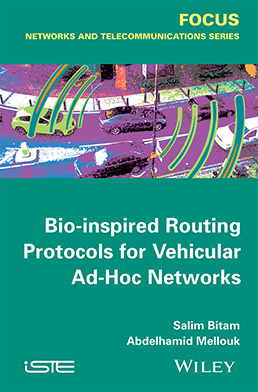
Vehicular Ad-Hoc Networks (VANETs) play a key role in developing Intelligent Transportation Systems (ITS) aiming to achieve road safety and to guarantee the needs of drivers and passengers, in addition to improving transportation productivity.
One of the most important challenges of this kind of network is the data routing between VANET nodes which should be routed with a high level of Quality of Service (QoS) to ensure messages are received in time. The driver can then make the appropriate decision to improve road safety. In the literature, there are several routing protocols for VANETs which are of varying reliability in reaching safety requirements.
In this book, the authors begin by describing all the basic concepts of VANETs, such as VANET definition, VANET versus Mobile Ad-hoc Network (MANET), architectures, routing definition and steps, Quality of Service (QoS) for VANET routing, metrics of evaluation, experimentation, and simulation of VANETs, mobility patterns of VANETs, etc. Moreover, different routing protocols for routing in VANETs are described. Two main categories are presented: classical routing and bio-inspired routing. Concerning classical VANETs, the main principles and all phases are overviewed, as well as their two sub-categories which are topological and geographical protocols.
Following this, the authors propose a new category called bio-inspired routing which is inspired by natural phenomena such as ant colony, bee life, genetic operators, etc. They also present some referential protocols as examples of each category.
1. Vehicular Ad Hoc Networks.
2. Routing for Vehicular Ad Hoc Networks.
3. Conventional Routing Protocols for VANETs.
4. Bio-Inspired Routing Protocols for VANETs.
Salim Bitam is Associate Professor and responsible for the Master in Decision Support Systems and Multimedia in the computer science department at the University of Biskra, Algeria, as well as a Senior Member of LESIA Laboratory (University of Biskra, Algeria), and Associate Member of LiSSi Laboratory (University of Paris-Est Créteil VdM, France). His main research interests are vehicular ad-hoc networks, mobile ad-hoc networks, wireless sensor networks, cloud computing, and bio-inspired methods for routing and optimization.
Abdelhamid Mellouk is Full Professor at the University of Paris-Est (UPEC), Networks & Telecommunications (N&T) Department and LiSSi Laboratory, France. Head of several executive national or international positions, he is the founder of the Network Control Research activity in UPEC with extensive international academic and industrial collaborations. His general area of research is in adaptive real-time control for high-speed new generation dynamic wired/wireless networking in order to maintain acceptable Quality of Service/Experience for added value services.